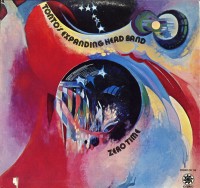
This fucking album. You’ve probably seen it in a one of your finer music emporia sometime over the last decade, looking all intriguing and phantasmagorical, whether with its original cover art or the reissue with the man-frogs and tadpoles.
Herbie Mann’s excellent Embryo imprint released Zero Time in 1971, and somehow Stevie Wonder heard it and became enamored of the dazzling constellation of analog-synth sounds created by Tonto’s Expanding Head Band’s members Malcolm Cecil and Robert Margouleff. Shortly thereafter, the duo got behind the console for the Motown legend’s strongest run of albums. In a brief period of time, TEHB went from obscure synth geeks to super-rich studio wizards. Boy, did they deserve it.
One listen to Cecil and Margouleff’s debut LP and you can understand why an innovative, intuitive musician like Steveland Hardaway Morris would want to siphon some of that aural magic. Created largely on a massive synth invented by Cecil called TONTO (The Original and New Timbral Orchestra), Zero Time purveys a genuinely futuristic soundworld, albeit one that still carries traces of symphonic richness and grandiose melodies.
Case in point is the opening song, “Cybernaut,” a gorgeously desolate brooder with a momentous bass line. There’s almost a Hollywood lavishness to this track, and it’s a mystery why it’s never appeared in a sci-fi film. Speaking of which, “Jetsex” always causes severe disorientation and creepiness with its metallic termite chittering, Doppler-effected whooshes, ominous bass growls, and proto-industrial-techno timbres. It’s an intensely visceral simulation of mechanical dysfunction and impending doom, and a perennial favorite for my weirder DJ sets. Play it at a party and watch everyone in the room grow extremely uneasy.
Things lighten up a bit with “Timewhys,” which is pretty much the polar opposite of its predecessor. It begins with a fade in of enigmatic whistling ululations before a spacey, awe-struck motif manifests out of the desolation, followed soon by a modified cha-cha beat and a libidinously thrusting bass line. Thence, it morphs into a bizarre species of dance music. This piece just sparkles and throbs with cosmic bonhomie. It’s no surprise why Future Sound Of London would sample it for their track “Her Tongue Is Like A Jellyfish.” Keeping things spacey, “Aurora” coaxes lunar wind storms into a forlorn and anguished symphony.
One of Zero Time‘s highlights, “Riversong” could be a forerunner of New Age—you know, the kind that sounds like it took a proper dosage of lysergic acid before assuming the lotus position. “Riversong” is a glistening wellspring of keening, clear-light tintinnabulation (the sound of angel orgasms?) beamed into your third ear, as a voice somewhere between robot and human eerily intones a poem written by Tama Starr “about the idea that we exist where heaven and earth meet, and that the stream of life flows on endlessly,” as Cecil explained in the liner notes to the CD reissue of Zero Time on Real Gone Music. Listen to “Riversong” next to David Byrne and Brian Eno’s “Mountain Of Needles” and try to tell me the former didn’t influence the latter. The album’s only real dud is closing cut “Tama,” which is both tonally slight and melodically schmaltzy, which puts it out of alignment with the rest of Zero Time.
Still, five out of six ain’t bad. On Zero Time, Tonto’s Expanding Head Band originated a vivid and variegated vocabulary of timbres and tones that have vastly influenced electronic music… and it still has the power to activate/enhance a drug trip, if you’re into that sort of thing. -Buckley Mayfield


